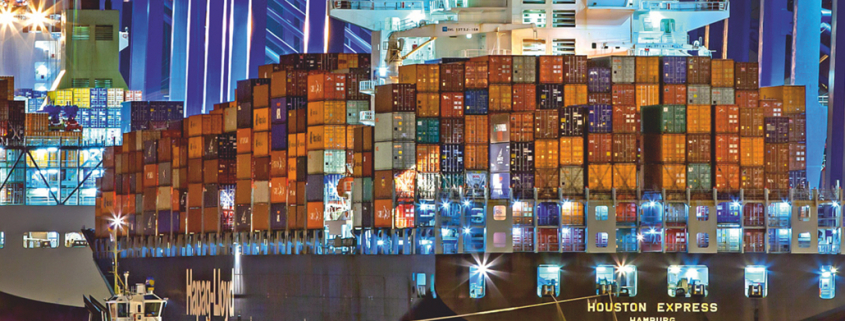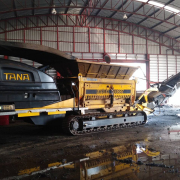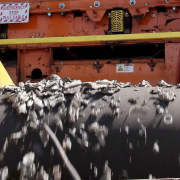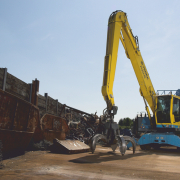cieTrade Business Management Software: Take Control of your Trading or Recycling Business
cieTrade is a global provider of commodity trading and recycling software. The American company offers business management and inventory solutions specifically for international trading houses, pulp and paper brokers, and commercial recycling plants.
Although the company started out primarily offering a solution for scrap and paper stock brokerage, cieTrade has greatly evolved into a powerful, agile platform that has allowed its clients to scale their business and reduce costs while helping them respond to changing market conditions and opportunities. In the following interview with Emily Ott, Global Recycling Magazine wanted to know more about the company’s specialized software solutions.
Which companies in the recycling industry can benefit from cieTrade’s business software?
The cieTrade platform is uniquely adapted to support a wide range of business models within the recycling and waste industry. This includes brokers buying from third-party suppliers and shipping to domestic and international receivers, brokers selling to overseas customers with and without using freight forwarders, commercial and MRF plant operations, retail recycling or buyback centers, scrap material processors such as plastics pelletizing or metal shredding, and waste brokerage for companies providing managed waste and recycling services for regional or national accounts.
Apart from features such as invoicing, customer accounts, customer database, equipment tracking, inventory management, waste disposal, and work order management, what other benefits does cieTrade software offer?
There are several additional benefits cieTrade offers depending upon the type of operation and how it is managed. Below are a few key features that clients have said are especially valuable:
- Mobile tablet app to handle received material grading, processing and shipping.
- Self-Inspection mobile app to capture and organize export container and claim photos.
- Mill Release Number Tracking.
- Freight Rate Management and 3PL integration.
- Finished Bale tracking and barcode labels from a mobile app.
- Support for bales routes using average weights.
- Automated settlement and billing process.
- Data capture tools to easily upload and batch edit shipping data from third parties.
- Route Management and mobile dispatch service app for drivers.
- Public Trade Point-of-Sale app and compliance for retail/buyback centers.
- Sophisticated tools to analyze the profitability of material streams by supplier/source.
- Seamless real-time integration with financial systems that can be easily reconciled.
- Self-Service web portals for customers and supply chain partners.
- Extensive Gross Profit, Tonnage and trend reports.
For Scrap Brokers and Exporters:
- Generating specialized shipping and export documentation and tracking document packages.
- Tracking budget to actual performance.
- Reporting gross profit by matching expense accruals with revenue (automating the accrual process).
- Managing ocean freight rates, bookings and fulfillment.
- Ecommerce integration with major ocean carriers.
- Easily visualizing profit on every brokerage deal.
Would you mind explaining these features in more detail, taking a recycling plant as an example? To what extent can the amount of work and expenses be reduced?
The advantages most clients realize from using our platform tend to include: potential reduction of existing or future staffing needs, increased productivity and accuracy, in part by eliminating double-entry and manual procedures, improved customer service with faster, easier access to vital information, and greater business insight for improved decision making and control. Quantifying the effective value or reduction in costs associated with these is always difficult to determine and can vary significantly among companies with different operating practices.
However, for a typical recycling operation where in/out bound loads are printed on physical tickets, later recorded on spreadsheets and, again, cut and pasted into settlement reports or customer billing, our platform introduces a significant reduction in keystrokes, potential errors, time spent manually compiling reports, searching for information and updating accounting software. In these cases, delivering ROI is relatively easy to achieve and in a fairly short time (especially given the competitive cost of our software). Less tangible but often just as critical, especially for growing operations with multiple sites or companies with third party stakeholders, is having a standard operating platform to improve scalability, establish reporting consistency, and improve training and manageability of staff.
For example, here is a simple illustration of how cieTrade helps to reduce work and minimize overhead costs:
– Inbound loads are initially weighed using scale integration and are received directly into the software instead of using physical scale tickets.
– These “electronic” tickets are matched up with a corresponding customer, pickup location and a related price letter, eliminating the need to track loads on spreadsheets or with hand written notes on tickets.
– Once the trailer arrives in the yard to be unloaded, our warehouse grading app helps grade and process tickets, eliminating the handwritten paper breakdown sheets.
– Since grading is performed within the software, your back office receives instant notifications and can easily confirm or make corrections as needed without double-entry, handling of physical tickets, or deciphering handwritten notes.
– Once grading is confirmed, the material is instantly posted to inventory, eliminating manual material tracking (if that is even being performed).
– Since each ticket is matched with a customer, location, price letter and service charges, the settlement process can be fully automated, eliminating the need to manually compile statements and post accounting entries. For a recycling plant with numerous commercial accounts, the time savings and improved accuracy of this one process can save several days of work each month.
– Outbound loads are staged and set up within the software so they are tracked and scheduled all in one place.
– Documentation such as Bill of Ladings, Delivery Confirmations, or Packing Lists can be automatically generated, eliminating manual documents and improving the organization by attaching them to corresponding tickets.
– When a trailer arrives, its release number can easily retrieve the record of the scheduled load, further eliminating the need to track this separately and further helping to eliminate shipping errors.
– Scale weights are captured directly from the scale onto the outbound load ticket (again eliminating manual tickets and double-entry) to produce a net shipping weight.
– Next, billing workflow tracks in-process loads that need received weights or that have been shipped but not billed to avoid costly errors and oversights while final billing is performed directly within the software to further eliminate manual entry in accounting and on spreadsheets to track out-bound weights.
– As a result of these processes, your floor inventory is also maintained, providing improved visibility of material grades on hand while eliminating manual stock lists.
– Specialized reports on tonnage, sales, purchases, gross profit, and more can all be easily generated on demand without spending hours of work compiling manual reports from paper tickets or copying and pasting spreadsheet data.
Efficiency is gained as a direct result of eliminating duplicate entry, automation of processes, and generating reports. Costs are reduced as an indirect result of saved labor, reduced or eliminated mistakes and oversights, improved customer service, and better reporting and analytics for improved decision making on pricing and account management.
When talking about plastic recycling, for example, the quality of the processed material is crucial – as in other industries. How can cieTrade’s solution control inventory value, production costs, and material sources for quality assurance?
Providing effective traceability of material and tracking of actual or “landed” inventory value is a critical requirement for most recycled plastic processors and a major weakness for many ERP systems that often need to be heavily customized to do this.
cieTrade natively supports this requirement first by using a “serialized” inventory model to capture received material. This allows individual items such as boxes or bales to be tracked with specific attributes such as supplier, grade, type, receive date, net weight, condition and more, all identifiable by a unique barcode. Inventory items are initially valued using a “landed” cost that includes any related receiving expenses such as freight or handling costs into its overall value. Warehouse storage and other charges can also be added to further improve costing accuracy. When feedstock inventory is selected for processing, its landed cost value plus any production costs such as labor or machine run-time can all be allocated into the “output” or production value of each finished item on a weighted average basis, including the effective cost of yield loss through production. The material sources of these finished goods are connected back to the processing job that created it which, in turn, is linked to the specific feedstock items selected as “input” and the ticket it was received on, making it easy to trace the source material for any finished item and identify what load and supplier it came from and when.
For companies that export recycled commodities overseas, cieTrade offers software solutions for international trading, which provide appropriate tools. What are the main features?
The complexity and demands of international trade can be difficult for any software to properly support. cieTrade approaches this challenge by offering a highly flexible and dynamic platform that can be tailored to meet the diverse needs of scrap commodity traders. This includes critical features such as:
- Support for complex trading scenarios with multiple suppliers to a customer order or multiple customer orders to one supplier.
- Sales Order pre-calc, budget, and approval process to manage and control order profitability and reduce risk.
- Specialized tools to easily upload container details from suppliers.
- Ability to manage ocean freight rates, bookings, reserve allocations to suppliers and its fulfillment.
- Container tracking, container booking assignment, and sales disposition all from one specialized “dashboard”.
- Ecommerce integration with ocean carriers to submit BOL instructions and more.
- Ability to generate export shipping documentation and provide LC business support using customizable templates and tools.
- Customizable documentation package and status tracking.
- Logistical reporting on booking and shipping activity for internal operations and customers.
- Profitability reporting by order, shipment, customer, grade, supplier, market etc.
- Assigning currency contracts to orders and transactions.
- Customer/supplier portals to expedite documentation and status updates on orders.
Due to the pandemic, international trade is restricted by high transportation costs and the lack of freight containers. Can the software factor in ocean freight rates, trucking, and inspection costs?
Yes, all related logistical and business expenses are accounted for in the gross profit reporting of every shipment/order. Our unique worksheet concept captures revenue, cost of goods sold, and related expenses such as ocean & inland freight, marine insurance, inspection, gate fees, and more. Actual costs can be analyzed against budgeted estimates using our pre-calc tool so that cost discrepancies are easily identified against benchmarks. Users can also create “advance” bookings before issuing purchase orders to help secure container reservations in tight markets. cieTrade helps manage current ocean and inland freight rates, reports on historic rates, and provides specialized reports to analyze tonnage and freight costs by carrier, shipping lane, and more.
Can the exporting company also track containers for scrap, pulp, lumber, or paper stock?
Yes. cieTrade offers the flexibility to manage export shipping containers with a wide range of bulk material and packaging types including bales, boxes, lumber bundles, paper stock or pulp rolls, and even sheets just to name a few. Packing lists can be customized to summarize container information or provide details and specifications based on specific commodity types. Container information can be easily imported from suppliers without manual entry using our spreadsheet upload tool and then tracked from our Container Management dashboard where logistics, documentation, and billing status can all be viewed. From here weights and other container details can be easily edited, bookings can be changed, and containers assigned to a bill of lading and commercial invoice. You can even generate VGM certificates and submit BOL instructions directly to steamship lines using our built-in e-commerce connectivity with Infor-Nexus.
(Published in GLOBAL RECYCLING Magazine 2/2021, Advertorial, Page 24, Photo: Julius Silver /pixabay.com)












